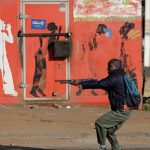Police believe while the Operation Dudula Movement which is trying all it can to drive out foreigners who came to look for employment in South Africa is gaining momentum in Gauteng, there are signs it is spreading to KwaZulu-Natal and, to a lesser extent, Limpopo and Mpumalanga.
They said Operation Dudula’s activities were likely to heighten xenophobic tensions and cause instability with South Africa’s neighbours in the Southern African Development Community.
On Friday, police management briefed the Portfolio Committee on Police on their investigations into Operation Dudula activities.
“An issue of concern is that [Dudula] members are perceived by their supporters to be fulfilling the functions of state departments and local municipalities in terms of addressing the issue of illegal foreign nationals. This sets a dangerous precedent and heightens the risk of vigilante activity against foreign nationals,” a police presentation read.
Furthermore, the violence against foreign nationals on a domestic front could have an impact on South Africa elsewhere on the continent.
“Foreign nationals from the neighbouring countries might create chats and utilise social media platforms to mobilise and plan retaliatory attacks on all South African citizens employed and working in respective neighbouring African countries if the planned attacks on foreign nationals continue. The situation may also affect foreign nationals who are legitimately employed in South Africa and also refugees and asylum seekers,” the presentation read.
It added there appeared to be a failure by several government departments.
“This is also evident of the failure of other role players such as the Department of Home Affairs, Department of Employment and Labour, Department of Small Business, municipal authorities, to either communicate their compliance inspections or is evidence of a lack thereof. Both of these aspects [communication strategy as well as actual compliance inspections] would be the key mitigation to prevent the spread of unauthorised compliance inspections of both businesses and foreign national operations,” the presentation said.
Additional concerns around the activities of Operation Dudula include extortion, a potential risk that the expansion of the grouping could be in anticipation of simultaneous and coordinated action similar to those of July 2021.
“Action against them by law enforcement is being used to garner more support; and in the unlikely event of a concerted mobilisation, SAPS will potentially not have the resources to contain the situation to operate on multiple fronts.”
According to police, Operation Dudula leader Nhlanhla “Lux” Mohlauli was allegedly the representative of the Soweto Defence Force, and Soweto Parliament.
Although his surname was widely known to be Dlamini, documents have revealed it is Mohlauli. The organisations describes itself as a non-political movement that aims to be the voice of ordinary Sowetans.
“[They claim] that they are only attempting to establish law and order. He achieved some prominence during the July 2021 unrest when he led community members in the defence of facilities in their neighbourhoods, and in particular the Maponya Mall,” the presentation read.
He was arrested after a case was opened at the Dobsonville police station in Soweto last month. Victor Ramerafe’s house was allegedly ransacked by members of Operation Dudula, supposedly because they thought it was a drug den. Ramerafe, who is an EFF member, was supported in opening the case by the party, led by Julius Malema.
Nhlanhla Lux was granted bail of R1 500 with the conditions that he does not make any contact with Ramerafe, and that he surrender his passport to the investigating officer.
Police bosses said 52 early warnings relating to Operation Dudula were received and acted upon between January and March.
“The root causes contributing to the conflict between citizens and foreign nationals may not be within the domain of the SA Police Service to be dealt with, but requires an all-of-government approach to address it,” the presentation read.
“The issue of anti-foreigner sentiment is underpinned by the current socioeconomic dynamics of the country and the consequent competition for scarce resources. Until a point is reached where socio-economic issues have been resolved to a greater extent, the risk for mobilisation around the issue of foreign nationals will remain prevalent.”



